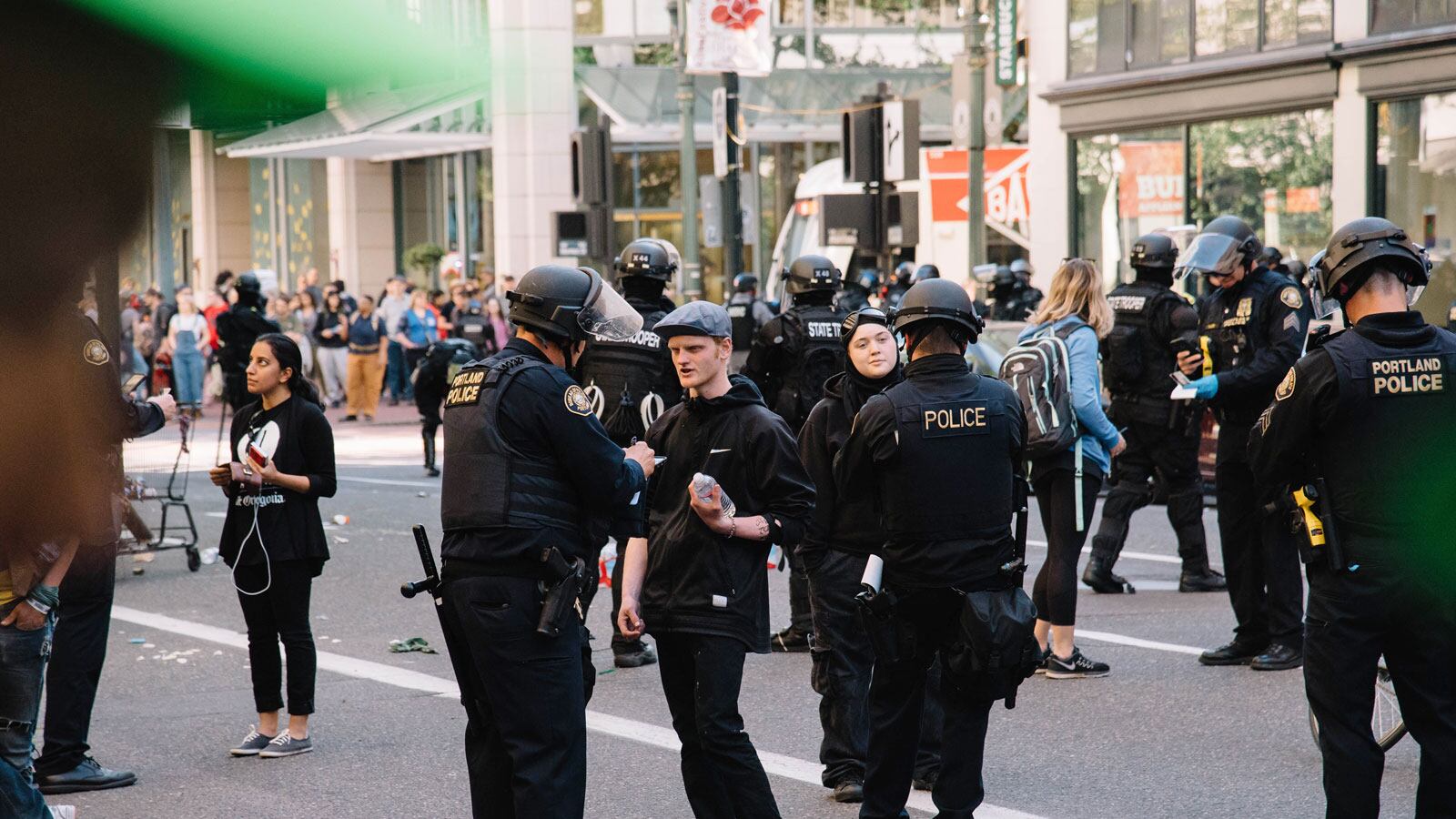Despite reassurances that it would do so, the Portland Police Bureau failed to delete nearly 400 photos taken of protesters' IDs during a mass detention at a protest against right-wing groups held on June 4, 2017.
The city's Independent Police Review identifies numerous policy shortcomings in a review of police actions at the protest, which set the city on edge last spring. Officers surrounded and detained 389 people at the demonstration, including reporters for the local and national press.
IPR recommends the bureau adopt new policies governing mass detentions, evidence documentation, partnerships with other law enforcement agencies and photographing demonstrators engaged in protected free speech activities.
Last year, a Vancouver-based protest group called Patriot Prayer organized a "Freedom March" just days after a man who had previously shown up at the group's protests allegedly hurled Islamophobic insults and killed two men and severely wounded another on a MAX train in Portland.
At least 1,000 counterprotesters surrounded the Patriot Prayer group, including a group of masked antifascists who clashed with lines of riot police.
The June 4 protest drew harsh criticism after observers accused police of treating counterprotesters more harshly than the alt-right patriot group.
IPR's review confirms that Portland police officers admit to treating far-right protesters aligned with Patriot Prayer differently than the antifascists and counterprotesters who showed up to oppose them.
The report published by IPR Thursday morning says an unnamed PPB lieutenant acknowledged the Patriot Prayer members, who were in Chapman Square, received different police treatment. He blamed the discrepancy on Rose City Antifa's lack of "hierarchical structure" saying the lack of a clear leader "made it difficult for [the Police Bureau] to find a single point of contact to convey information."
The review also revealed that then-Police Chief Mike Marshman made misleading statements about the bureau's intent to delete the photos taken of 389 people detained at the event. At the time, Marshman said "any photographs not used in a criminal investigation will be purged pursuant to PPB policy." (Marshman initially denied that police had photographed IDs at all, but quickly backtracked and said the bureau would destroy the photos. That claim was echoed by a police spokesman.)

But the IPR review shows that PPB had no policy on the books governing the retention of digital images and the bureau retained the photos for months even though it was not using them in a criminal investigation.
Community members raised concerns with IPR that the photos may be shared with federal agencies or used as "intelligence gathering" related to the photographed individual's political affiliations.
The photos are now subject to a court protective order and cannot be destroyed.
PPB has been sued for its actions on June 4 by the American Civil Liberties Union of Oregon, which is representing the people temporarily detained when police used a tactic called "kettling".
In its response to the review and IPR's recommendations, Portland police made some concessions and pointed to attempts to draft new policies to address some of the concerns raised.
However, the bureau says the procedure to change its directives is "slow moving."
IPR suggested the bureau record demonstrations with GoPro cameras. PPB says it is already working on a policy to bring body cameras to the force, but that is an effort that has been in the works with few signs of progress since 2014.
The review also recommended that PPB record radio communications that could document the rationale behind detentions and use of force during protests. The bureau disagreed with IPR's assessment and said it would not start recording communications on encrypted radio channels that police use to pass messages during protests because it would be "detrimental to the safety of both officers and the public."
PPB provided no further explanation of why recording the radio channels for records would be a safety risk.
The police bureau says it will update its directives related to mass detentions and the capture and retention of photos of detained people who have not been charged with a crime.
